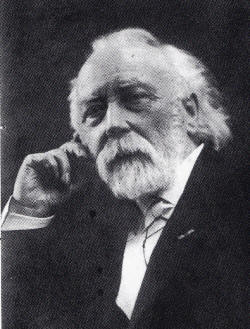

Queer Places:
Eugeen van Oyestraat, 8820 Torhout, Belgium
 Eugenius
Josephus Marie (Eugeen) Van Oye (Torhout, June 3, 1840 - Gistel, June 4,
1926) was a Flemish doctor, poet and playwright.
During his schooling at the Klein Seminarie in Roeselare
Guido Gezelle
dedicated to him the famous Dien Avond en die Rooze.
Eugenius
Josephus Marie (Eugeen) Van Oye (Torhout, June 3, 1840 - Gistel, June 4,
1926) was a Flemish doctor, poet and playwright.
During his schooling at the Klein Seminarie in Roeselare
Guido Gezelle
dedicated to him the famous Dien Avond en die Rooze.
Van Oye was the son of doctor René van Oye (Tielt, 1813 - Torhout, 1894), who published a lot on medical grounds. After initial humanities studies at the Klein Seminarie of Roeselare (1854-1858), Van Oye completed his secondary studies in Torhout (1858-1860). As a result, the father wanted to withdraw his son from the influence of Guido Gezelle who encouraged him to become a priest. Van Oye studied medicine at the Catholic University of Leuven between 1860 and 1866. He became a member of the Leuven student association "Met Tijd en Vlijt", a society of flamingants. He then continued his studies at the University of Ghent until 1870. There he came in contact with Julius Sabbe and Max Rooses and he participated in activities of the liberal student associations "'t Zal wel gaan" and "De Taal is gansch het volk".
During the French-German War, Van Oye volunteered as a doctor at the Red Cross in the French Army. In 1871 he settled as a doctor in Ostend and married the German Maria Rumschöttel. They had a son, Paul van Oye (1886-1969), who followed the family tradition and became a doctor, but specialized as a professor of zoology in Ghent.
Van Oye's doctor's practice kept less than poetry and music. He maintained good contacts with Peter Benoît and became an avid lover of Richard Wagner's music. Germanic and Scandinavian influences were noticeable in him.
During the First World War he was, at the insistence of Reverend Jan Derk Domela Nieuwenhuis Nyegaard, who was minister in Ghent and also temporarily in Ostend, chairman of the activist association Jong-Flanders. This association worked for an independent Flanders, which would maintain close economic and cultural ties with Germany and the Germanic world. He resigned in 1917, but in 1918 he was still appointed honorary president. After the ceasefire, he was arrested on charges of collaborating with the enemy. After a fierce plea by Hugo Verriest the martial court of Bruges acquitted him. Van Oye was roamed as a member of the Royal Academy of Dutch Language and Literature and also got a professional ban, on which he withdrew in Gistel.
With Hugo Verriest, Gustaaf Verriest, Karel De Gheldere and Charles Callebert, Van Oye is considered one of the pupils of Gezelle. Van Oye remains is especially remembered as the one for whom Guido Gezelle wrote the famous poem Dien Avond en die Rooze.
The teacher exerted a lasting influence on Van Oye's style. Because of the work Godelieve van Gistel, in 1924 he was awarded the State Prize for Flemish theater theory.
On texts written by Van Oye, songs were composed by Peter Benoît, Hendrik Waelput, Edward Keurvels, Karel Mestdagh, Emmanuel Hiel, Arthur Meulemans and Oscar Van Durme (1867-1925).
My published books: